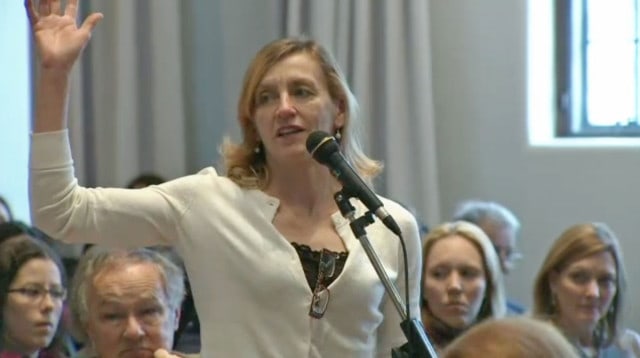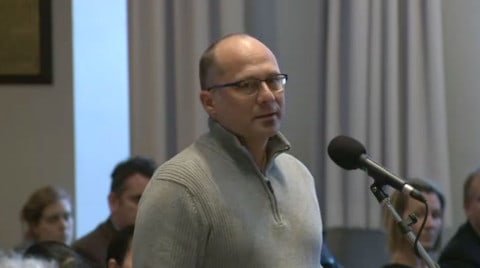
Claire Card, professor from the Western
College of Veterinary Medicine, asks for a show of hands as to who was involved in the review process of TransformUS.
The University of Saskatchewan has begun gathering responses and recommendations to the TransformUS taskforce reports as the first two of three town halls were held on Jan. 8 and 9.
Intended to accumulate to an annual saving of $20 million, TransformUS is a program prioritization process to deem which programs should receive more or less funding, remain as they are, be reconfigured or be phased out. Both academic programs and support services were reviewed by their own taskforces over a period of approximately three months.
Both town halls opened with an address from University President Ilene Busch-Vishniac wherein she stated that the taskforce reports are only recommendations and that the university, specifically the Provost’s Committee on Integrated Planning, is doing an analysis on which should be carried out or modified.
A question sent in online from Heather Ross, Instructional Design Specialist at the Gwenna Moss Centre for Teaching Effectiveness, said it would be good to know how Busch-Vishniac thinks the taskforce reports mesh with university planning documents such as the Third Integrated Plan.
Busch-Vishniac said she is pleased with how the taskforces were able to consider the values of the Third Integrated Plan because they are short-term recommendations with long-term impacts on the university.
“In reading the reports I can see where the committees tried to make that connection and use that as part of their evaluation process,” Busch-Vishniac said.
Murray Drew, associate vice-dean academic for the College of Agriculture and Bioresources, said he sees a lot of issues with providing enough enrollment for students in courses such as biology, mathematics and chemistry. These departments received many recommendations for reduced funding in the academic programs taskforce report. Using biology as an example, Murray said he would like to know how the university will be able to address the class registration issues by decreasing funding to those areas.
In response, Busch-Vishniac said that issues like backlogs of students in certain departments will be taken into account when PCIP analyzes the feedback.
Student Zane Arnott posted a related question regarding departments that are already dealing with small budgets. If these programs — such as mathematics — are candidates for reduced funding, he asked if they could end up getting cut as their resources become extremely limited.
“Our intention is not to take programs that were listed in category three [candidates for reduced funding] and necessarily slate them for demise,” Busch-Vishniac replied.
An online question asked why the TransformUS timeline was not aligned with students’ calendar. Busch-Vishniac replied that she consulted with the U of S Students’ Union as to whether the taskforce reports should be released in December, as they were, or in January.
Greg Marion, associate professor of music theory, said he was concerned that curriculum renewal would be stalled during TransformUS as the two initiatives depend on the university’s budget. Busch-Vishniac said the U of S is a university and must continue to operate as one through this time of financial uncertainty.
Busch-Vishniac spoke to a question of whether upper administration came across any surprises in the taskforce report. She said she was surprised at how uniformly the university’s priorities are spread across campus because there had been a lot of anxiety that there would be a particular college targeted for cuts.

English professor Brent Nelson is concerned that small programs aren’t evaluated fairly based on the unavailability of a lot of their information.
Also addressing the concern of targeting certain programs for phasing out, Busch-Vishniac explained the number of programs and services suggested for phasing out appears high because there are many programs that are no longer active but have never been removed from the university’s files.
Western College of Veterinary Medicine professor Claire Card said she would like to see more information pertaining to the process of the academic reviews so that there could be a greater understanding as to what faculty, staff and students should do with the taskforce reports.
Alec Aitken, professor in the Department of Geography and Planning, asked how the U of S could maintain its mission of providing post-secondary education to Saskatchewan — notably in northern rural areas — if a vast majority of the services from the Centre for Continuing and Distance Education are cut.
A second question from Aitken, the review process for interdisciplinary programs, was a common topic at both town halls. Aitken said he believes that these programs were not adequately reviewed through TransformUS. Although Toxicology and the School of Environment and Sustainability were not recommended to undergo any changes, other programs could not provide the proper information to the templates.
Aitken said teaching efforts, staff and faculty complement, research activity and student teaching activity couldn’t be sorted out from centrally administered data and teaching efforts are sometimes spread out across a number of departments and colleges.
“The process left many of those [interdisciplinary] programs shortchanged,” Aitken said.
At the Jan. 9 town hall, Brent Nelson, associate English professor and director of the Classical, Medieval and Renaissance Studies program, reiterated the concern for small, interdisciplinary programs not being able to provide data for the templates.
He said he would like to see other means to evaluate small programs such as their incorporation of institutional values, areas of emphasis and interdisciplinarity.
That same day Busch-Vishniac and other senior administration present were unable to answer a question asking how degree minors work into TransformUS and how they will be affected.
Feedback can be sent in online at words.usask.ca/transformUS and via email at transformus@usask.ca. A town hall will be held exclusively for students on Jan. 15 in the Graduate Student Association Commons from 12:00 p.m. to 1 p.m.